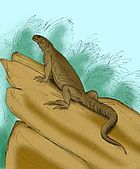Huehuecuetzpalli
| Huehuecuetzpalli Temporal range: Middle to Late Aptian,
| |
|---|---|

| |
| Artist's reconstruction | |
| Scientific classification | |
| Domain: | Eukaryota |
| Kingdom: | Animalia |
| Phylum: | Chordata |
| Class: | Reptilia |
| Order: | Squamata |
| Genus: | †Huehuecuetzpalli Reynoso, 1998 |
| Type species | |
| †Huehuecuetzpalli mixtecus Reynoso 1998
| |
Huehuecuetzpalli mixtecus is an extinct lizard from the Early Cretaceous (specifically the middle to late Aptian stage) Tlayúa Formation in Tepexi de Rodríguez, Central Mexico. Although it is not the oldest known lizard, Huehuecuetzpalli may be the most basal member of Squamata (the group that includes lizards and snakes), making it an important taxon in understanding the origins of squamates.[1] It may or may not be a basal member of Iguania, a large clade of lizards that traditionally includes the iguanas and their close relatives, chameleons, and agamids: if it is an iguanian, H. mixtecus represents the earliest major offshoot of the squamate evolutionary tree.
Unique characteristics (autapomorphies) of Huehuecuetzpalli include a long pair of premaxilla bones at the tip of the upper jaw that contributes to an elongated snout and the apparent retraction of the external nares or nostril openings. At the top of the skull, a small rounded postfrontal bone and a hole called the parietal foramen between the junction of the frontal bone and the parietal bone (the frontoparietal suture) suggest affinities with iguanians, but the retention of divided premaxillae, amphicoelous vertebrae (vertebrae that are concave at both ends), thoracolumbar intercentra (bones between the vertebrae of the back), an entepicondylar foramen in the humerus (upper arm bone), and a second distal tarsal bone in the foot supports the hypothesis that Huehuecuetzpalli is a basal squamate.
Citations
- ^ Reynoso V-H 1998. Huehuecuetzpalli mixtecus gen. et sp. nov: a basal squamate (Reptilia) from the Early Cretaceous of Tepexi de Rodríguez, Central México. Philosophical Transactions of the Royal Society, London B 353:477-500.





